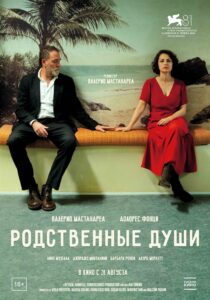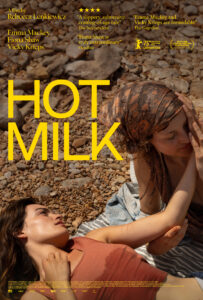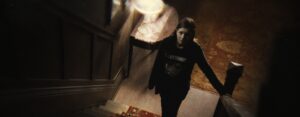One-liner: This slick sequel features a handsome cast, stunning vistas and a fun premise but struggles to connect beyond its lightweight and superficial feel.
Years after their work-ignited romance, the couple from the popular romantic comedy Semi-Soet returns in Semi-Soeter, now at a crossroads of career success and a conscious choice for a child-free life. Fate intervenes when a high-stakes baby brand business deal requires them to impress a new client by unexpectedly minding a baby at a picturesque wineland destination. This sudden plunge into parenthood forces them to confront the unique challenges of raising a child, prompting Jaci to re-evaluate motherhood, marriage and a future with JP.
Director Joshua Rous once again delivers a slick production thirteen years after the original. The film is visually stunning, showcasing some of Cape Town’s most breathtaking views. Semi-Soeter boasts a handsome and talented ensemble, with Anel Alexander and Nico Panagio effortlessly recapturing their natural chemistry and sense of history as the co-leads. While older, the appealing co-leads jump straight back into the Semi-Soet dynamic.
The talented supporting cast includes: Dianne Lawrenson, Neels van Jaarsveld, Louw Venter and Sandra Vaughn, who form a strong core. At times the performances seem uneven as though some actors were given more leeway than others when it comes to Semi-Soeter’s comic sensibility and desired tone. Each accomplished actors, this lightweight family comedy movie doesn’t give them the character or comedy to truly shine. The ensemble’s dynamic, centered around a wine farm like the original, is now infused with the chaos of babies and children, shifting the focus from romance to family and responsibility.
The sequel attempts to capture the same energy that made Semi-Soet so enjoyable, offering a natural “next turning point” for the couple as they weigh relocating to Dubai against putting down roots at home. It’s a compelling setup, built on the audience’s existing connection with the leads and their romantic journey up to this point. Unfortunately, trying to capture this zest by simply adding more youth doesn’t quite do the trick.
Semi-Soeter makes a distinct tonal departure from its predecessor. While Semi-Soet was a more straightforward romantic comedy, the sequel leans heavily into baby and family humour of the next chapter. This shift, while aiming for playfulness, seems tonally inconsistent with the original’s romantic core. The comedy often feels forced, resorting to easy laughs rather than allowing humour to organically arise from earned situational dynamics. This can lead to an “overcooked” feel, where genuine moments of comedy and drama are undermined by an underlying insincerity. This is further underlined by the twee comedy soundtrack, which attempts to embroider the humour when less would’ve been more.

Despite the beautiful backdrops, vivid visuals and colourful scenarios that make the film consistently watchable, the narrative struggles to achieve the same level of emotional depth or authentic entertainment as the original. While parents may find some struggles relatable, and the competitive rivalry among old schoolmates has its moments, the film remains largely superficial. It doesn’t quite allow the audience to fully immerse themselves or genuinely root for the co-leads beyond their established connection from the first film.
Ultimately, Semi-Soeter functions as a competent commercial sequel, successfully revisiting a beloved couple and exploring their next chapter. It’s a testament to the cast’s talent and the production’s professionalism. However, in its attempt to broaden its appeal and reinvent itself, it unfortunately lacks the script, conviction, and tonal dexterity to truly hit its mark. While resourceful, it’s not the seamless “rinse and repeat” success of Semi-Soet one would’ve hoped. The film would have benefited from more nuanced script development to better balance the romance, comedy and drama inherent in its ambitious premise.




